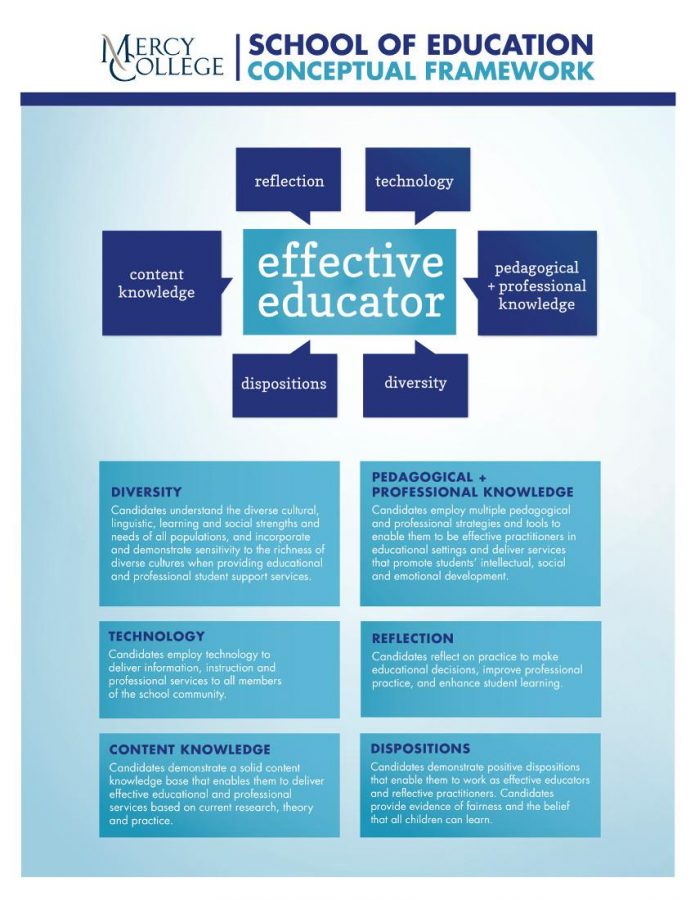School of Education Seeks To Be First College With Dual Accreditation
Mercy College will be the first and only school in all of the United States that has a double accreditation in its School of Education.
On Nov. 17, an event including a show and tell of the School of Education, some poster boards and other high-tech presentations will attempt to impress a group of seven judges from the CAEP and hopefully earn a prestigious distincton.
“Every school of education in the United States has to be accredited by an organization. Currently the only organization that has accredited Mercy is NCATE. It is an acronym for the National Council of the Accreditation of Teacher Education,” said Dr. Alfred S. Posmentier, the Dean of the School of Education.
NCATE is fusing with TEAC, and together are now called CAEP, which stands for the Council of the Accreditation of Professional Education.
“We wrote a huge document called the institutional report. It summarizes and describes everything that we do in the school. This document is sent to CAEP and now a group of seven people coming from all over the United States, as far away as Hawaii, are coming to see if what we wrote in the document is actually true.”
There are seven experts who will come to Mercy College to judge the college through visual representations for a week. They will judge the School of Education to see if the double accreditation is deserved. These seven people who come from all over the United States, even as far as Hawaii, will speak to students, professors, facilities and so on.
“The reason for the event on Sunday was to do a show and tell. Each of our programs had a poster board and some high-tech displays to look at,” he said.
“The visitors will be going from presentation to presentation, looking at what we offer in our program and talking to the faculty to get a sense of what we are all about,” said Posmentier. “On Nov. 18 and 19, they will be all over campus.”
The preparation for this event has taken place years in advance, with training and research that has been done already. This process can’t be done after a month or two, but instead more like a year or two.
“We have been working for two and a half years for the preparation for the visit that is going to take place on Sunday,” he said beforehand. “The preparation required that every aspect of the School of Education and three other areas of the college, counseling, school of psychology, and communication disorders are also involved– their programs had to be approved by their respective professional organizations a year ago.”
Mercy College will find out the final results in spring, but there is a great feeling all around that Mercy will do phenomenally.
“They are going to speak to facilities, the president, the provost, me, students, and the faculty – everyone to make sure everything we said is accurate,” explained Posamentier. “They then issue a report, and I am sure that everything is going to go very well, and we get the final result this spring. I can tell you right now that I anticipate that we will be the only college in the U.S that will get initial certification in both NCATE and CATE.
“We are going to be unique,” he added.
With such great-spirit and enthusiasm about this new accreditation that will only benefit Mercy College, all faces are looking happy.
“We hope that all will work out well,” said Posmentier while smiling.
Yet how will the event impact Mercy as a whole?
Posmentier had no problem answering this question, with great eagerness to explain the program and what it is going to do for Mercy.
There have been posters all around Mercy Hall and some parts on Main Hall that are labeled as conceptual frame work that describe what the objectives in the program are.
According to the poster boards that are throughout Mercy, the effective educator includes a professional with the sense of reflection, technology, content knowledge, and disposition, diversity, pedagogical and professional knowledge.
“Part of this process has also been an assessment of our students. They are meeting with what we call our conceptual framework; those are our over-arching objectives. The way this impacts any college, is that it forces the college to look at itself, because as you present yourself, you look at yourself.”
Ending the whole interview with a great analogy, Dean Posamentier said with a great smile on his face. He is very sure that Mercy College is going to do well as a whole. He is determined for the program that he has been working on for years to succeed.
“It is like when you are getting dressed. You look in a mirror to see if you’re looking well so you can go out. That is our mirror, to see if we are doing the job right.”

Erminia Errante is FINALLY A SENIOR with an English Education major and a journalism minor. Living in Brooklyn, she has a passion for writing and loves...








